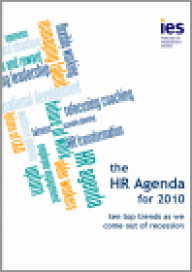Publications
 We author and publish a range of resources to keep you up to date with the latest developments in employment, labour market and human resource policy and practice.
We author and publish a range of resources to keep you up to date with the latest developments in employment, labour market and human resource policy and practice.
All our pdf publications are free to access.
Search results
-

Implementing Shared Professionals
An evolving guide
Reilly P, Fairhurst P | Feb 2010 | Capital AmbitionThis guide is intended to help local authorities consider whether, and how, they might share professionals or professional services with other organisations. The guide is informed by a series of case studies; a number of which are published on the Capital Ambition website. It is planned to add to the list of case studies as the project progresses and update this guide as new lessons are learned.
-

Employment and Support Allowance: Early implementation experiences of customers and staff
Barnes H, Sissons P, Aston J, Dewson S, Stevens H, Williams C, Francis R | Feb 2010 | Department for Work and PensionsFrom October 2008 Employment and Support Allowance (ESA) replaced Incapacity Benefit and Income Support paid on incapacity grounds for new customers. This report represents the first stage of the evaluation of ESA and presents the findings from an early implementation study. It is based on fieldwork carried out in May and July 2009 in four Jobcentre Plus districts across Great Britain.
-

Flexible forms of work: ‘very atypical’ contractual arrangements
Broughton A, Biletta I, Kullander M | Feb 2010 | European Foundation for the Improvement of Living and Working ConditionsThis report examines the recent evolution of some specific flexible employment contractual arrangements in the EU Member States and Norway. Within the broader category of ‘non-standard forms of work’, the overview focuses on the ‘very atypical’ forms of work, namely: part-time work of fewer than ten hours a week, very short fixed-term contracts, zero hours working, and non-written contracts.
-

Skills Priorities and Scenarios in the Justice Sector
Usher T | Feb 2010 | Skills for JusticeThis report details the findings of a research and consultation project conducted on behalf of Skills for Justice between September and November 2009. The main objectives of this work were to: identify key skills drivers, skills needs and priorities in the justice sector; and develop a small number of future skills scenarios regarding the justice sector workforce to assist Skills for Justice to support the Justice sector in future workforce planning.
-
📄
Professional and Financial Services Cluster Report
Sissons P, Levesley T | Feb 2010 | Skills for JusticeThis report examines skills needs within the Professional and Financial Services (PFS) Cluster. The PFS Cluster was highlighted in the Government White paper New Industry, New Jobs as an area where the UK had a competitive advantage and which offered the potential for growth across global markets. The cluster represents a group of industry strands contained within five Sector Skills Councils
-

Skills for Jobs: Today and Tomorrow - The National Strategic Skills Audit for England 2010, Volume 1, Key Findings
Feb 2010 | UK Commission for Employment and Skills / Department for Business, Innovation and SkillsThis publication provides an overview of the key findings of the first National Strategic Skills Audit for England 2010: Skills for Jobs: Today and Tomorrow. The Audit aimed to provide government, as well as employers, providers, individuals and public agencies with greater insight and foresight into England’s existing and future skill needs.
-

Skills for Jobs: Today and Tomorrow - The National Strategic Skills Audit for England 2010, Volume 2: The Evidence Report
Feb 2010 | UK Commission for Employment and Skills / Department for Business, Innovation and SkillsSkills for Jobs: Today and Tomorrow was the first National Strategic Skills Audit for England produced by the UK Commission for Employment and Skills. The Audit provided key intelligence on England's existing and future skills needs in both current and emerging industries. This report draws upon an examination of the 'drivers of change'; a set of labour market projections; and detailed sectoral analysis.
-

Evidence-based Reward Management Toolkit
Brown D et al. | Jan 2010 | e-RewardThis 'how-to' toolkit chronicles the key components of evidence-based reward management: conducting reward reviews; measuring the impact of reward programmes; evaluating that impact; and then developing, implementing and applying reward policies and practices on the basis of the evidence you have assembled.
-

The HR Agenda for 2010
Ten top trends as we come out of recession
Garrow V (ed.) | Jan 2010 | Institute for Employment StudiesThe HR team at IES reflected on some of the priorities for organisations as they started to emerge from recession and looked to the future. In these short articles topic leaders provided insights that had emerged from recent consultancy and research practice across the public and private sector.
-

Economic Evaluation of the Small Firms Loan Guarantee (SFLG) Scheme
Cowling M | Jan 2010 | Department for Business, Innovation and SkillsThis research provides a comprehensive assessment of the wider economic impact of SFLG arising from supported businesses being able to access loans that they would otherwise not have received. The impact of SFLG is assessed on a number of business outcomes including employment change, sales change, labour productivity, likelihood to export, and propensity to introduce new products and processes.
